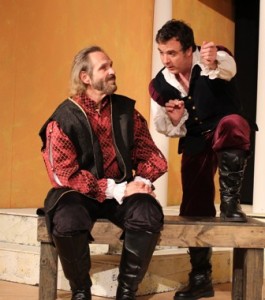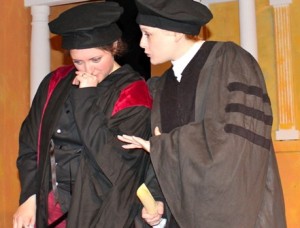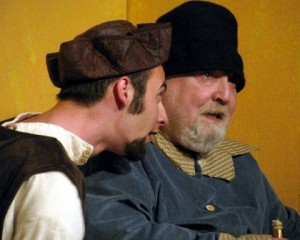
DeLarme Landes (Antonio), Brian Jason Kelly (Bassanio) in a scene from THE MERCHANT OF VENICE at Actors’NET of Bucks County.
A stranger at a Venetian trial flips the verdict and dispenses harsh justice for the accuser in THE MERCHANT OF VENICE by William Shakespeare, playing at the Actors’NET of Bucks County, May 31 through June 16. The 16th century play, under the deft direction of Cheryl Doyle, serves as a figurative throw down of justice onto the grainy courtroom floor, when two men with opposing religious convictions and common disdain, battle at trial for one to emerge the victor.
More is at stake here than the outcome – it’s all in for someone’s soul. Who wins is up for public speculation. Virtue is sometimes subjective to a point. The twist in this Shakespearean adventure is that the accuser becomes the accused in the end and his comeuppance, though seemingly just by law, is still unacceptable to contemporaries who sympathize with victims of persecution. Beneath the playful atmosphere, comic conundrums and romantic liaisons of THE MERCHANT OF VENICE run the darker underbelly of human nature, persecution and intolerance – and justification for any of these actions.
Meet Antonio (played astutely by DeLarme Landes as the forlorn main-titled character), a glum merchant of Venice, who vouches to cover a loan of 3,000 ducats for his best friend Bassanio (Brian Jason Kelly) a love-forlorn poor man in need of money to court the rich Portia of Belmont (played with great instincts and stage-commanding presence by Kyla Mostello Donnelly). By signing the contract, Antonio, who awaits a bounty from several ships at sea, becomes beholden to the moneylender Shylock (Actors’NET favorite veteran George Hartpence) – a Jew persecuted for his religious beliefs, his conviction and his vocation.
Shakespeare humanized Shylock’s ire when he proclaims, “Hath not a Jew eyes? …When you prick us, do we not bleed?” In other words – I am Jewish, I am human, these are things that both Jews and Christians feel – and Shylock is calling his adversaries out on anti-Semitism. Sure, the play’s the thing, but, Shakespeare, who never was one to objectify his characters, points out the light and dark aspects of the human condition, and despite our differences, our distinct similarities.
Shylock is guarded, defensive and hostile towards a world that never welcomed him or his daughter, Jessica (the self-assured, flirty Amanda Hecht), who steals his money and flees with her Christian lover, Lorenzo (the swarthy, smooth John Helmke). Religious persecution can wear down the human soul. This is the mantle worn by Shylock, and his heightened avarice leads him to the outrageous demand of flesh as the only equitable payment for an unpaid loan to his bothersome nemesis, Antonio. Unless the debt can be paid in three months Antonio must relinquish a pound of his flesh to cover the forfeiture. Antonio agrees to the terms of the contract, never thinking that he might not pay by the deadline. And, yes, therein lies the rub. Shylock has an opportunity to seek revenge on a Christian man who has made his life hell.
Meanwhile, Portia’s dead father decreed that his daughter’s future husband be chosen via a lottery by way of a gold, silver or lead casket. Doyle leads the players through a clever comedic scene of rotating caskets and princely pontifications by the Prince of Monaco (Carlo Campbell) and the Prince of Arragon (James Cordingley) as each vies for the wealthy lady’s hand in marriage. The key around her neck opens the correct box containing her picture. Only she and her lady-in-waiting, Nerissa (beguiling Maryalice Rubins-Topoleski) know which holds the prize. If either Prince chooses a box without the picture, then they must vow to never contact Portia again. The time on this scene could be condensed. Campbell works his magic to evoke laughs from the audience, but the whole scene seems to drag. The facial reactions between Mostello Donnelly and Rubins-Topoleski, though, are ingenious and worth the price of admission.
Rounding out the cast was Michael Wurzel as Salerio, John Wishnie as Solanio, Aaron Wexler as Gratiano, Rob Norman as Tubal, Julia Mitchell as the Singer/Servant, Marco Newton as Old Gobbo. Special acknowledgements to Mark Swift as the spot-on hilarious Launcelot Gobbo, and Mort Paterson, who plays the regal Duke of Venice.
The action (20 scenes) quickly transitions, so kudos to the production team, especially Kathleen Landes, Stage Manager and her crew. The set design by George Hartpence and his team, Jamie Bradley and James Cordingley, traversed interesting levels for the actors. Lovely Renaissance costuming by Cheryl Doyle, Evelyn Fletcher and Darlene Klem, with special props to Arlene Kohler.
Shakespeare incorporates an emotionally manic finale to this play – the feel-good ending of love found as Portia and Nerissa reveal their matrimonial rings to their husbands and uncover their secret that led to Antonio’s freedom, Antonio’s second chance at life, and the juxtaposition of the annihilation of Shylock’s life in court by cool and calculating Portia – the loss of his wealth, daughter, home and ultimately, his religion. The moment back in Belmont when Jessica reads the document outlining all she will inherit after her father dies and sees all she has lost.
The most jarring moment of the play is the animalistic cry from Hartpence when his Shylock must surrender all that gives him life. Portia has him remove his yarmulke and he crumples to the floor. It’s one of the most moving few seconds to uncomfortably sit through. It’s his surrender of soul that each person in the audience can palpably feel when you hear his muffled cry.
THE MERCHANT OF VENICE
by William Shakespeare
Directed by Cheryl Doyle
May 31 – June 16, 2013
Actor’s NET of Bucks County
The Heritage Center
635 North Delmorr Avenue
Morrisville, PA 19067
215-295-3694
www.actorsnetbucks.org





1 comment
LOVE ACTORS NET. REALLY LOVED LAST YEARS “CABARET” LOVED THAT MORE THAN “GYPSY ” WILL “PIRATES OF PENZANCE ” BE COMING SOON????